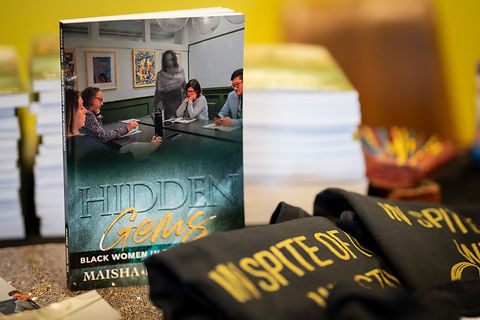

Hidden Gems
Black Women In The Workplace
Hidden Gems
Black Women in the Workplace
Hidden Gems is a literary work written with the struggles of Black women in the workplace in mind. It is not intended to bemoan those struggles, but instead to acknowledge them...to remind Black women that we are more than our struggles in the workplace. We are essential. We are brilliant. We are the blueprint.
The workshop is created and caters to the culture and dynamics of the requestor. Understanding that each workplace is in a different place in their journey of creating a safe and healthy environment as it relates to DEIB. Although the book specifically addresses the journey of Black women, the workshop is inclusive. It is a call to action for all, including Black women to have those hard conversations, develop a plan, and commit to the work. This workshop is not intended to be a "check the box" experience. The book itself has workbook questions throughout so that the reader is encouraged to do more than just read.
Ms. Howze has been very intentional in my work to create a safe, engaging, healthy, inclusive, and committed space for those in the workplace and community at large.
Hidden Gems Book Launch
April 2023


News and Events
City of Pittsburgh - Proclamation
March 25, 2023
"Maisha Howze Day"
in the City of Pittsburgh
Celebrating Excellence and Brilliance
Honoring Maisha Howze

Rob Taylor, Jr
Pittsburgh Courier
“Hidden Gems: Black Women in the Workplace,” touches on that difficult subject and other topics throughout its seven chapters and 118 pages. The book was released on March 25 during a release party at Ascender, on Penn Avenue in East Liberty.
Howze pulled together a group of 25 Black women in 2022 to discuss what it was like being a Black woman in the workplace. It’s a topic that has been studied for decades. A survey concocted by the Gallup Center on Black Voices in 2020 found that Black women were “less likely to feel they are treated with respect in the workplace,” and “less likely to feel like a valued member of their team.”
Words from Todd Kummer
Maisha,
Thank you. Thank you for inviting me to be on the cover of your book, for allowing me to share in your book release event, and for helping me to open my eyes to begin to truly understand the challenges faced by Black women, in the workplace and everywhere.
Being included on the book cover of Hidden Gems Black Women In The Workplace was a meaningful experience. Being included made me feel accepted and part of a community I may not have otherwise been a part of. It is also heartening to know that you wanted me to be a part of the book release where I had an opportunity to learn from a panel of accomplished Black Women discussing discrimination, racism, and the directly related challenges of being ignored.
Walking into the Ascender I was overcome by the awesomeness of the sunny weather, the beauty of the space, and the warmth of the lively crowd, and I felt welcomed and accepted. Welcomed and accepted - these words and associated feelings kept going through my head. It is abundantly clear to me that this feeling is not universal, and it's this disparity that hurts me the most. What was clear though, is that together we can make a difference so that everyone can be free, heard, welcomed, and accepted. As I mingled with those who are part of your inner circle, and with those who like myself are getting to know you, I felt that we were all on the same page, and willing to support each other - but I had a lot to learn. I had a realization that my challenges of growing up as a white gay man in rural Pennsylvania, pale in comparison to the challenges that were presented by you all, and allow me only the tiniest insight into the challenges of Black women. For that insight you provided to me, I will be forever grateful and forever changed.
It was humbling to learn from you and the panel while appreciating that each of you brings perspectives from differing disciplines and all so unique yet banded together. As I listened intently, I felt the love and compassion you all have for each other, the inspiration to drive change through shared experiences and I felt reassurance in your ideas for improving the future. I attempted to understand the anger and pain you feel having been made invisible and erased and having your perspectives often overlooked by dominant cultural narratives. In the end, the event solidified my resolve to positively support and defend Black women in my workplace.
Your knowledge, care, and love preceded you, Maisha. Thank you for sharing your world with me.
Todd


























